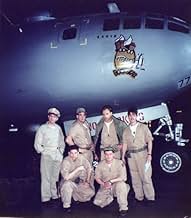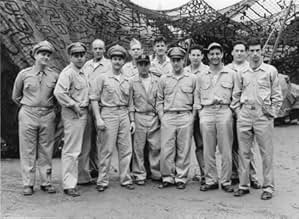The grisly events leading to the first attack with a nuclear weapon.The grisly events leading to the first attack with a nuclear weapon.The grisly events leading to the first attack with a nuclear weapon.
- Directors
- Writers
- Stars
- Nominated for 2 Primetime Emmys
- 6 wins & 8 nominations total
J. Winston Carroll
- Chief Justice Stone
- (as J.W. Carroll)
Tedd Dillon
- John Kuharek
- (as Teddy Lee Dillon)
Strahil Goodman
- Stalin's Interpreter
- (as Strahil Dobrev)
Domenico Fiore
- Harold Urey
- (as Dom Fiore)
- Directors
- Writers
- All cast & crew
- Production, box office & more at IMDbPro
Featured reviews
10rblayer
Perhaps the best made-for-tv movie I've ever seen. Historically correct and blended with real footage and interviews of actual participants I was spell-bound for three hours. The haunting musical score only added to the emotional story telling of this significant historical event.
Definitely one of the best historical movies I've seen. Doesn't cast political dispersions on the events or judge people in hindsight, simply gives a relatively even view of it from all sides (except for the Soviets, which would have been a good addition, if its ever even been discovered).
They did a really good job of mixing the B&W with color, old with new footage, etc. If you get a chance to see it, check it out.
They did a really good job of mixing the B&W with color, old with new footage, etc. If you get a chance to see it, check it out.
This is a brilliant, meticulous recreation of the events, both political and military, leading up to the tragic attack on Hiroshima in August 1945.
Brilliant performance by Kenneth Welsh as the Missouri haberdasher President Truman, strangely ill-dressed throughout this film in his trademark double-breasted suit and multi-coloured shoes. Here, Truman is a simplistic, Forrest Gump style president grappling with enormous moral issues about using the new gadget'.
The excellent cinematography recreates the story in newsreel style footage, intercut with interviews with several people from the time. Also, shows the Japanese situation in Tokyo and the hardline military people on both sides.
Brilliant performance by Kenneth Welsh as the Missouri haberdasher President Truman, strangely ill-dressed throughout this film in his trademark double-breasted suit and multi-coloured shoes. Here, Truman is a simplistic, Forrest Gump style president grappling with enormous moral issues about using the new gadget'.
The excellent cinematography recreates the story in newsreel style footage, intercut with interviews with several people from the time. Also, shows the Japanese situation in Tokyo and the hardline military people on both sides.
The closing stages of the Pacific Theatre of WWII are revisited recently by filmmaker Clint Eastwood, in his two movie compendium Flags of Our Fathers, and Letters from Iwo Jima, depicting the Battle of Iwo Jima from both perspectives of the Americans and the Japanese. Hiroshima, a made for TV movie in 1995 for Hallmark Entertainment, does so in one movie, clocking in at a massive 180 minutes.
But the running length is fully deserved, as this is probably as detailed one could get without boring the audience. Directed by Roger Spottiswoode and Koreyoshi Kurahara, they each take on their respective country's angle, beginning from April 12th 1945 with Roosevelt's death.
Spottiswoode focused on Truman's abrupt taking over the presidency, with a lot of catching up to do with regards to the war. As Vice President, he's kept largely out of the daily workings during Roosevelt's term, and suddenly is thrust into the hot seat with the passing of Roosevelt, making decisions that will affect countless of lives worldwide. Of note is the moral dilemma faced with the Manhattan Project, as well as looking into the inner circle's politicking of racing toward being the 1st nuclear power, and the demonstration of such a might with a public display of a detonation. You'll also see how the pilots train with mock bombs and mock targets during their countless drills just to get it right.
On the other hand, Kurahara was focused on the Japanese's lack of understanding and therefore deliberation on surrender, and takes a long hard look at how the Imperial Army dealt with impending invasion by the Allied forces. What's to note here is the portrayal of Emperor Hirohito, as he surveys his land bombed incessantly by B29s. Politics and bickering between politicians and the military take the spotlight here.
I'd bet most would find new nuggets of information from this informative dramatization of the events leading up to the detonation of the atomic bombs over Hiroshima and Nagasaki, like how Kyoto was deliberated over and spared, being the equivalent of a religious city, and a city with monuments worth preserving. I'd learn that the US actually had to call the bluffs, having only 3 bombs at the time, with Little Boy (Hiroshima's) made of uranium, and Fat Man (Nagasaki's) made of plutonium, and another plutonium one used as a test bomb, because the method of fission is slightly different from uranium's, and had to be tested first to ensure it works.
If technical details aren't your cup of tea, then perhaps cultural differences between the two countries, and the bridging of this understanding, might be of interest to you. It's equivalent to today's lack of understanding, and the lack of a well thought out strategy, that we see wars fought and degenerated into the issues faced today. It was interesting to note that prior to WWII, Japan had never lost a war, and therefore, doesn't know what defeat, nor surrender is, and hence, absolutely had no idea going about doing it. It could also be attributed to the Asian "face" value, that death always be a better option compared to a humiliating defeat.
Combined brilliantly with stock archive footage, documentary reels and interviews from veterans on both sides. Hiroshima is well worth the 3 hours spent watching it, unraveling itself like a history book. My only gripe was that the ending was abrupt, all over with the announcement of the Japanese surrender.
All Region DVD comes with no extras.
But the running length is fully deserved, as this is probably as detailed one could get without boring the audience. Directed by Roger Spottiswoode and Koreyoshi Kurahara, they each take on their respective country's angle, beginning from April 12th 1945 with Roosevelt's death.
Spottiswoode focused on Truman's abrupt taking over the presidency, with a lot of catching up to do with regards to the war. As Vice President, he's kept largely out of the daily workings during Roosevelt's term, and suddenly is thrust into the hot seat with the passing of Roosevelt, making decisions that will affect countless of lives worldwide. Of note is the moral dilemma faced with the Manhattan Project, as well as looking into the inner circle's politicking of racing toward being the 1st nuclear power, and the demonstration of such a might with a public display of a detonation. You'll also see how the pilots train with mock bombs and mock targets during their countless drills just to get it right.
On the other hand, Kurahara was focused on the Japanese's lack of understanding and therefore deliberation on surrender, and takes a long hard look at how the Imperial Army dealt with impending invasion by the Allied forces. What's to note here is the portrayal of Emperor Hirohito, as he surveys his land bombed incessantly by B29s. Politics and bickering between politicians and the military take the spotlight here.
I'd bet most would find new nuggets of information from this informative dramatization of the events leading up to the detonation of the atomic bombs over Hiroshima and Nagasaki, like how Kyoto was deliberated over and spared, being the equivalent of a religious city, and a city with monuments worth preserving. I'd learn that the US actually had to call the bluffs, having only 3 bombs at the time, with Little Boy (Hiroshima's) made of uranium, and Fat Man (Nagasaki's) made of plutonium, and another plutonium one used as a test bomb, because the method of fission is slightly different from uranium's, and had to be tested first to ensure it works.
If technical details aren't your cup of tea, then perhaps cultural differences between the two countries, and the bridging of this understanding, might be of interest to you. It's equivalent to today's lack of understanding, and the lack of a well thought out strategy, that we see wars fought and degenerated into the issues faced today. It was interesting to note that prior to WWII, Japan had never lost a war, and therefore, doesn't know what defeat, nor surrender is, and hence, absolutely had no idea going about doing it. It could also be attributed to the Asian "face" value, that death always be a better option compared to a humiliating defeat.
Combined brilliantly with stock archive footage, documentary reels and interviews from veterans on both sides. Hiroshima is well worth the 3 hours spent watching it, unraveling itself like a history book. My only gripe was that the ending was abrupt, all over with the announcement of the Japanese surrender.
All Region DVD comes with no extras.
Hiroshima is a great film, originally made for cable, about events leading up to the A-bomb being dropped on Japan. It shows the Japanese perspective very well and is one of the better WW2 films of recent years. Surprisingly, it is mostly a Canadian production that is very accurate with the facts they put on screen. Very well done.
Did you know
- TriviaWhile directing, Roger Spottiswoode tried to be even-handed in the portrayal of the Japanese military leaders, and it was the Japanese co-director who would keep coming back and saying "You don't really understand; they were much more intransigent than that." Some of the top military men over there had a pretty good idea of the resources required for the bomb, and didn't believe anyone could sustain the attacks.
- GoofsGeneral Groves General's rank is improperly shown. Even a 2 star General's stars are worn centered between the shoulder and the button, not out toward the sewed-down portion or often seen on that portion itself.
- ConnectionsFeatured in The 48th Annual Primetime Emmy Awards (1996)
- SoundtracksCantus in Memoriam for Benjamin Britten
Composed by Arvo Pärt
Details
- Runtime
- 3h 10m(190 min)
- Color
- Sound mix
- Aspect ratio
- 1.33 : 1
Contribute to this page
Suggest an edit or add missing content



























